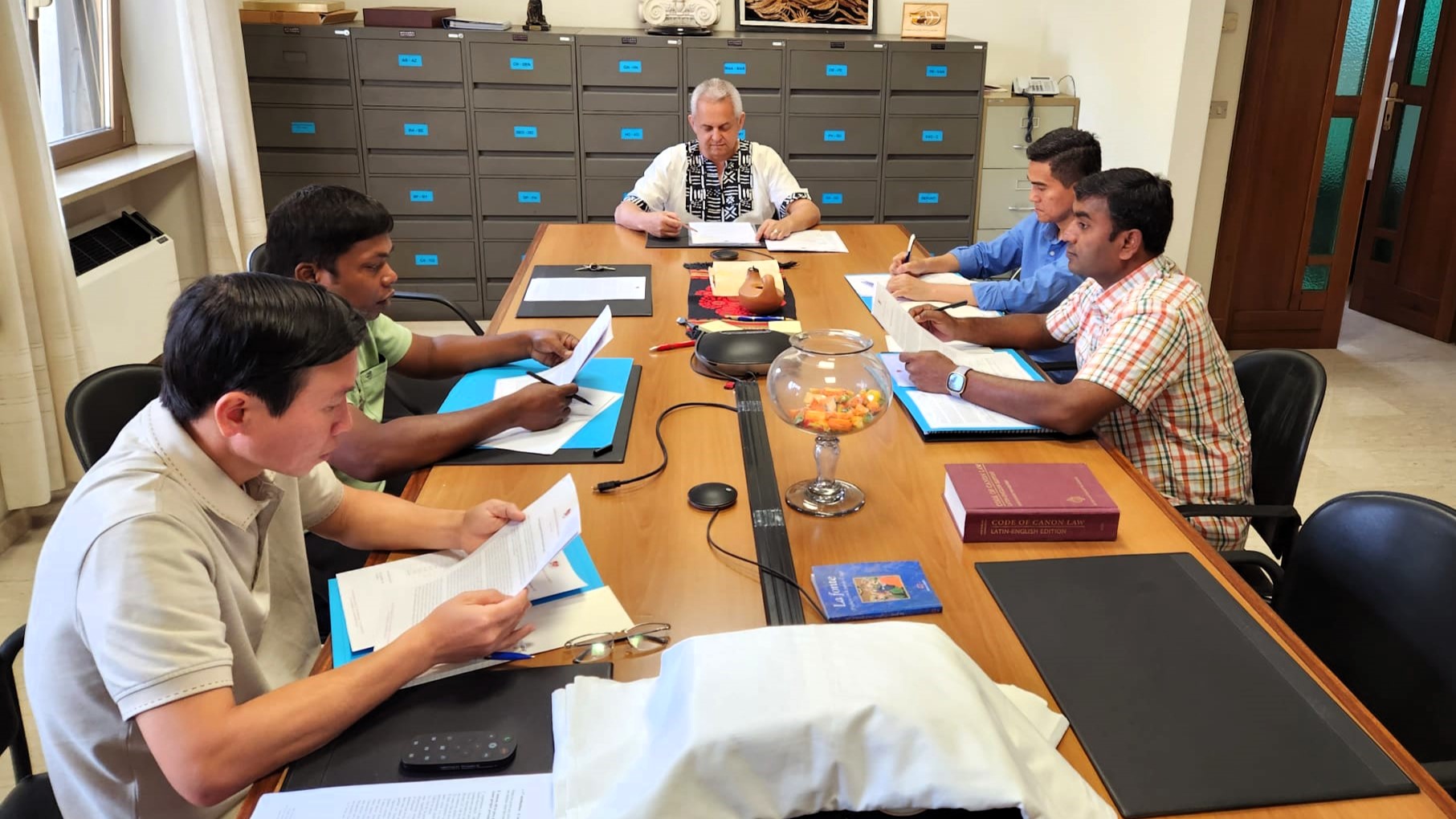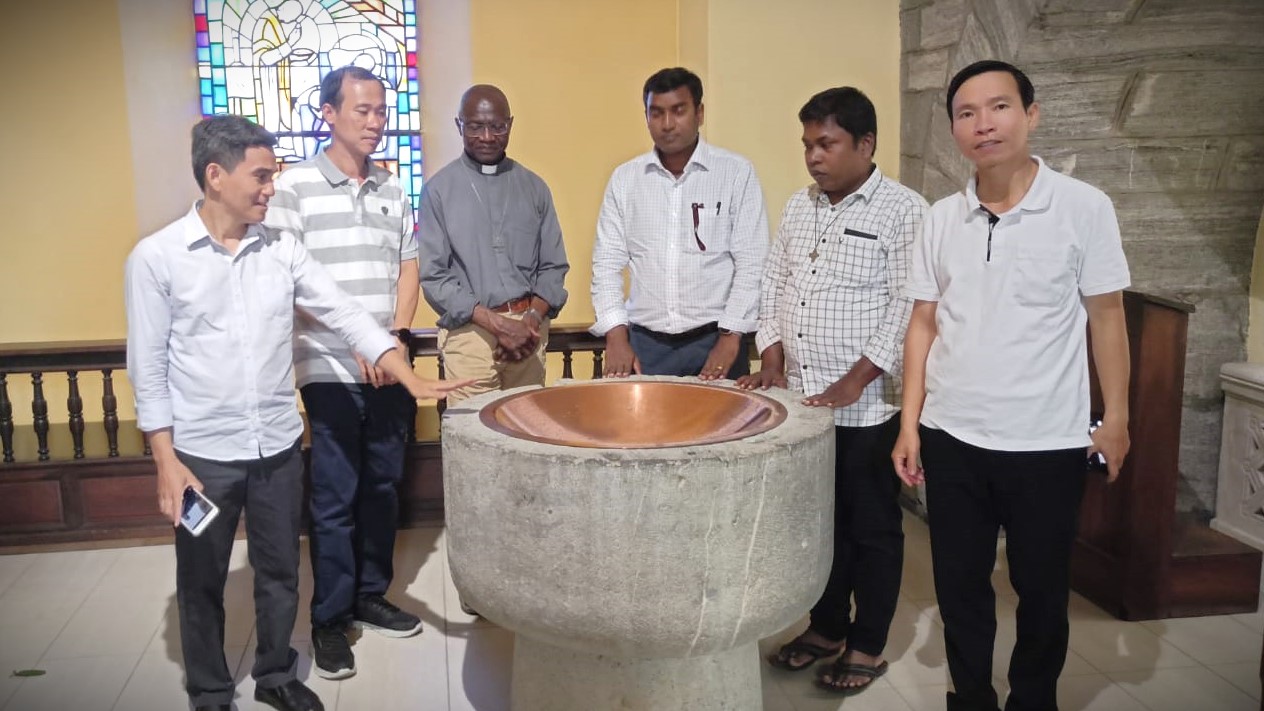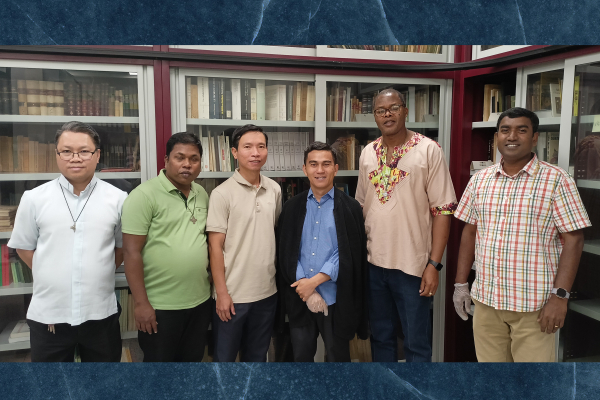fathers Binh, Lazar, Martin, Joseph, Agostinho, Devan
Introduction
The formation program for the SSS formators was held at the Blessed Sacrament Generalate in Rome. The formators were Frs. Joseph Nguyen Duc Thang (scholastic director) and Martin Le Trung Hieu (novice master) from Vietnam, and Frs. Devan Arul (scholastic director) and Lazar Ganaprakasam (novice master) from India. It was scheduled from September 4, 2023 to September 19, 2023. It had two parts:
1) Formation for formators
2) Visit to the Eymardian places
Both the programs were well organized. It is like theory and practical, the formation programme gave us knowledge on formation, especially specific to our SSS formation and our visit to the founder’s places gave us a new understanding.
Welcoming and Introducing
Rev. Fr. Eugenio Barbosa Martins, the General superior, welcomed the formators for the formation programme. In his welcome address, he spoke about the importance of formation how the future of our congregation depends on our formation. We must excel in our content and pedagogy but more than that, we have to excel in our testimony. The formation consists of three persons: the Holy Spirit, Formees and the formator. The Holy Spirit is the main agent of every formative process; the trainee interacts with the Holy Spirit and the formator represents the institute. The Rule of Life defines the direction of the entire formative process. The role of the formators is to carry out God’s will in the personal vocation of each formee and systematize them in the charism of the congregation. It is to accompany formees in the formation process and help the congregation to give the best witness of consecration.
SSS Today
Fr. Eugenio gave the session on topic “The Congregation of the Blessed Sacrament Today”. He said that the Rule of Life is as our Gospel of the Eucharist. We are made aware of clericalism in the church and in our congregation. We are known as Blessed Sacrament fathers; what about the brothers in the congregation? It is seen in the importance we give to our brothers in the congregation. We form religious of the Blessed Sacrament not the priests of the Blessed Sacrament. Our ideal is to live the mystery of the Eucharist fully; this leads to meaningful celebration of the Eucharist and the witness of life and mission. Rule no 21 affirms that our communities are to be fraternal, praying and serving communities. He emphasized the importance of constructive and effective use of media; keeping up the vow poverty considering the struggle of the common people for their survival, being aware of sexual and power abuse. We need to understand internationality as irreversibility experienced in Europe, North America and Australia and grow in Eucharistic spirituality.

Formation for Transformation
Rev. Fr. Agostinho Maholele, the general consultor and in charge of formation, gave sessions on formation such as our objectives, pedagogical process, values to transmit, human capacities besides Follow Me, Rule of life, Vademecum with group works and sharings. Our objective is to carry out ‘aggiornamento’ to respond to challenges and needs of today’s young people who are in love with Jesus in the Eucharist. Our Active participation is important in all the process of formation. As Fr Imoda sj says “Every human person is a masterpiece of God”. The particularities of each formee should be respected. We cannot fit everyone in a same frame. It is a macroscopic view not microscopic. The Formative stages of Fr Imoda sj are Presence, Absence and Transformation. Presence means physical presence of the formator; it means our transmission of contents and values, accompaniments both personal and group, availability, empathy and listening to what is spoken and the eloquence of silence. Formation leads to transformation, transformation is to transcend. Absence also is important in our house of formation.
Absence means absence of everything which the presence gives not only the physical absence of the formator. It is important for internalization of everything presented at the time of presence. Absence means accountability, responsibility, and inner freedom of the formees. Only a balanced dose of presence and absence of the formator will bring desired growth and maturity. As formators we need to understand ones vocation. The anthropology of Christian vocation speaks of three processes: Complacency, Identification and Internalization. In other words, it is pleasing, imitating and assimilation of values. Follow me to be followed in all the formation houses; it is not a suggestion but a decision. It should be evaluated and personalized. Initial formation is up to diaconate. Human maturity is our relationship with human persons; Christian maturity is our relationship with God.
Our Learning and Experiences
Rev. Fr. Joseph Vu Quoc Binh, the general secretary, spoke about General administration and took us to the office, archives and museum. It helped us to become familiar with the structure and file keeping. Through our visit to Museum and archives we came to know importance given to our founder's writings.
The archivist, Rev. Fr. Joseph Le Huu Phuoc, explained to us how the documents are preserved. They are well bound, kept in order, and have climatic proofs. A lot of hard work is put into arranging, organizing and preserving these materials. We were happy to see the original hand written notes of father Eymard. It reveals to us about our founder’s interest in writing; his foreseeing to pass it on to the next generation and inspires us to media ministry today.
Rev. Fr. Rizieri Santi took a session on Desiderio Desideravi, the apostolic letter of Pope Francis on liturgy, which comes from the Latin version of Gospel of Luke, “I have earnestly desired to eat this Passover with you before I supper” (Lk 22:15). Understanding the Eucharist and celebrating meaningfully is very important. Jesus’ desire to eat the Passover he awaits for everyone and invites everyone to eat the Passover. The meaning of the cross is to be understood in connection with the last supper. Eucharist is sign of God’s love. Symbols, space, gestures, silence, mindfulness, genuflection, and tone of voice are very important. We need to form people for liturgy and we need to be formed by the liturgy.
Rev. Fr. Vittore Boccardi spoke about our connection and contribution to Eucharistic Congresses. How our founder is connected with the Eucharistic Congresses and we keep that through our taking responsibility in the Holy See for the international Eucharistic Congress and working together and our participation in all the Eucharistic Congresses. With his vast knowledge, he spoke about all the International Eucharistic Congresses held in the church in different countries. It is through Emile, a Blessed Sacrament nun, and Fr. Eymard was her spiritual director who supported the Eucharistic congresses.
Rev. Fr. Philip Benzy, general treasurer, took session on finance; a lot of money is spent on formation where do we get money? He taught us the basic principles in handling finance such as principle of transparency, sharing and sustainability. He spoke about the spirituality of treasurer: the treasurer need to practice moderation, justice, prudence and strength in spending money. Budgeting, accounting, reporting and reviewing are important tools in finance.
Our visit to Eymardian places
We felt fortunate to stay at our founder’s house in La Mure and visit the very places that were significant to him and that shaped his life. We have been teaching our formees from the books on our founder; certain things are difficult for us to understand and describe. By visiting the places of our founder St. Peter Julian Eymard, it is clear and we feel at home. We are with clarity, confidence and conviction now. His life inspires us and impels us to do our ministry. Places of his parish ministry at Chatte, Monteynard show his commitment. His love for Eucharist and Mary was tremendous and deep, his visit to Notre Dame du Laus, Notre Dame de l’Osier, La Salette proves that. He is a man of meditation and contemplation his visit to the Three crosses, Rock of Romans, his reflections and retreat notes reveal that. To understand the person we have to be in his place, not only in his place, but we have to walk some miles in his footsteps. It is our personal witness to St. Peter Julian Eymard walking through the Eymardian places. The La Mure community had taken care of us very well we thank to Fr. Thaddée Mupapa, the superior, who was tirelessly taking us around the places and explaining to us the context and connectivity and we thank all the fathers of La Mure community for their hospitality.

fathers Joseph, Phuoc, Thaddée, Devan, Lazar, Martin
Conclusion
We are grateful to God for giving us this opportunity. We are indebted to our General Curia, Fr. Eugenio and team for arranging this programme and conducting it meaningfully. We thank Fr. Agostinho for planning and implementing this programme. We thank our respective provincials Rev. Fr. Joseph Ai Dinh Pham, the provincial of Vietnam, and Rev. Fr. Peter Jayakanthan, the provincial of India, for their help and support. We thank the parish community here for their welcoming and hospitality. Overall, it was a memorable and meaningful learning experience. We assure our best in the formation ministry.
Father Lazar Gnanaprakasam sss
Novice Master - India

